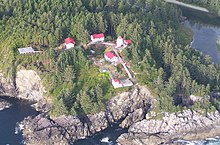Cape Beale Lightstation is an active manned lighthouse on Vancouver Island in British Columbia, Canada.
 Cape Beale Lighthouse | |
 | |
| Location | Cape Beale Vancouver Island British Columbia Canada |
|---|---|
| Coordinates | 48°47′11″N 125°12′56″W / 48.78639°N 125.21556°W |
| Tower | |
| Constructed | 1874 (first) |
| Construction | steel skeletal tower |
| Height | 10 metres (33 ft) |
| Shape | square pyramidal tower with balcony and lantern, central cylinder, slatted daymarks on three sides |
| Markings | red tower and lantern |
| Operator | Canadian Coast Guard[1] |
| Heritage | heritage lighthouse |
| Light | |
| First lit | 1958 (current) |
| Focal height | 48 metres (157 ft) |
| Characteristic | Fl WR 5s. |
History
editThe lighthouse was built in 1874 and its focal plane is 51 meters above sea level. The present tower was built in 1958 and marks the entrance to Barkley Sound. It is 10 metres tall. Cape Beale received its name from Charles William Barkley, captain of the Imperial Eagle, who named it for his ship's purser, John Beale. The lighthouse is best known for its proximity to the West Coast Trail which is the theoretical route survivors of shipwrecks would take to get to the nearby community of Bamfield.
From 1971 to 1998, the Cape Beale Light was part of the British Columbia Shore Station Oceanographic Program, collecting coastal water temperature and salinity measurements for the Department of Fisheries and Oceans everyday for 27 years.[2]
Geography and climate
editCape Beale Light has a rainy and mild Oceanic climate (Köppen: Cfb; Trewartha: Dolk).
| Climate data for Cape Beale Light Coordinates 48°47′10″N 125°12′58″W / 48.78611°N 125.21611°W; elevation: 25.9 m (85 ft); 1991–2020 normals, extremes 1984–present | |||||||||||||
|---|---|---|---|---|---|---|---|---|---|---|---|---|---|
| Month | Jan | Feb | Mar | Apr | May | Jun | Jul | Aug | Sep | Oct | Nov | Dec | Year |
| Record high °C (°F) | 15.5 (59.9) |
18.0 (64.4) |
20.0 (68.0) |
21.5 (70.7) |
25.5 (77.9) |
34.5 (94.1) |
30.0 (86.0) |
32.0 (89.6) |
30.0 (86.0) |
24.0 (75.2) |
17.5 (63.5) |
14.0 (57.2) |
34.5 (94.1) |
| Mean daily maximum °C (°F) | 8.4 (47.1) |
8.9 (48.0) |
9.8 (49.6) |
11.5 (52.7) |
13.9 (57.0) |
15.4 (59.7) |
16.8 (62.2) |
17.0 (62.6) |
16.4 (61.5) |
13.4 (56.1) |
10.4 (50.7) |
8.4 (47.1) |
12.5 (54.5) |
| Daily mean °C (°F) | 6.1 (43.0) |
6.2 (43.2) |
7.1 (44.8) |
8.6 (47.5) |
11.1 (52.0) |
12.8 (55.0) |
14.1 (57.4) |
14.3 (57.7) |
13.6 (56.5) |
10.8 (51.4) |
7.9 (46.2) |
5.9 (42.6) |
9.9 (49.8) |
| Mean daily minimum °C (°F) | 3.6 (38.5) |
3.5 (38.3) |
4.2 (39.6) |
5.8 (42.4) |
8.3 (46.9) |
10.1 (50.2) |
11.3 (52.3) |
11.6 (52.9) |
10.7 (51.3) |
8.2 (46.8) |
5.3 (41.5) |
3.5 (38.3) |
7.2 (45.0) |
| Record low °C (°F) | −6.5 (20.3) |
−10.0 (14.0) |
−3.0 (26.6) |
0.5 (32.9) |
2.0 (35.6) |
4.0 (39.2) |
4.0 (39.2) |
7.5 (45.5) |
5.0 (41.0) |
−2.5 (27.5) |
−9.0 (15.8) |
−8.0 (17.6) |
−10.0 (14.0) |
| Average precipitation mm (inches) | 429.6 (16.91) |
263.1 (10.36) |
290.3 (11.43) |
216.5 (8.52) |
114.9 (4.52) |
98.5 (3.88) |
52.1 (2.05) |
84.9 (3.34) |
121.3 (4.78) |
287.7 (11.33) |
431.3 (16.98) |
386.6 (15.22) |
2,776.8 (109.32) |
| Average rainfall mm (inches) | 422.9 (16.65) |
260.7 (10.26) |
288.5 (11.36) |
216.4 (8.52) |
114.9 (4.52) |
98.5 (3.88) |
52.1 (2.05) |
84.9 (3.34) |
121.3 (4.78) |
283.9 (11.18) |
430.0 (16.93) |
383.5 (15.10) |
2,757.5 (108.56) |
| Average snowfall cm (inches) | 2.3 (0.9) |
2.4 (0.9) |
1.9 (0.7) |
0.0 (0.0) |
0.0 (0.0) |
0.0 (0.0) |
0.0 (0.0) |
0.0 (0.0) |
0.0 (0.0) |
0.0 (0.0) |
1.4 (0.6) |
3.5 (1.4) |
11.4 (4.5) |
| Average precipitation days (≥ 0.2 mm) | 22.7 | 19.0 | 23.0 | 19.8 | 15.4 | 13.1 | 11.3 | 12.8 | 14.7 | 20.4 | 23.9 | 23.4 | 221.4 |
| Average rainy days (≥ 0.2 mm) | 22.6 | 18.8 | 22.9 | 19.8 | 15.4 | 13.1 | 11.3 | 12.8 | 14.7 | 20.3 | 23.6 | 23.2 | 220.4 |
| Average snowy days (≥ 0.2 cm) | 0.70 | 0.76 | 0.65 | 0.03 | 0.0 | 0.0 | 0.0 | 0.0 | 0.0 | 0.04 | 0.44 | 0.69 | 3.3 |
| Source: Environment and Climate Change Canada Canadian Climate Normals 1991–2020[3] | |||||||||||||
See also
editReferences
edit- ^ Rowlett, Russ. "Lighthouses of Canada: Southern British Columbia". The Lighthouse Directory. University of North Carolina at Chapel Hill. Retrieved December 25, 2015.
- ^ "British Columbia Lightstation Sea-Surface Temperature and Salinity Data (Pacific), 1914-present - Open Government Portal". open.canada.ca. Treasury Board of Canada. Retrieved 2021-02-11.
- ^ "CAPE BEALE LIGHT". Canadian Climate Normals 1991–2020. Environment and Climate Change Canada. Climate ID: 1031316. Retrieved 2024-11-09.
- Rowlett, Russ. "Lighthouses of Canada: Southern British Columbia". The Lighthouse Directory. University of North Carolina at Chapel Hill.
External links
edit- "Cape Beale". BC Geographical Names.
- Aids to Navigation Canadian Coast Guard
- Cape Beale Lightstation
- Mills Landing Cottages and Charters
- Bamfield, British Columbia